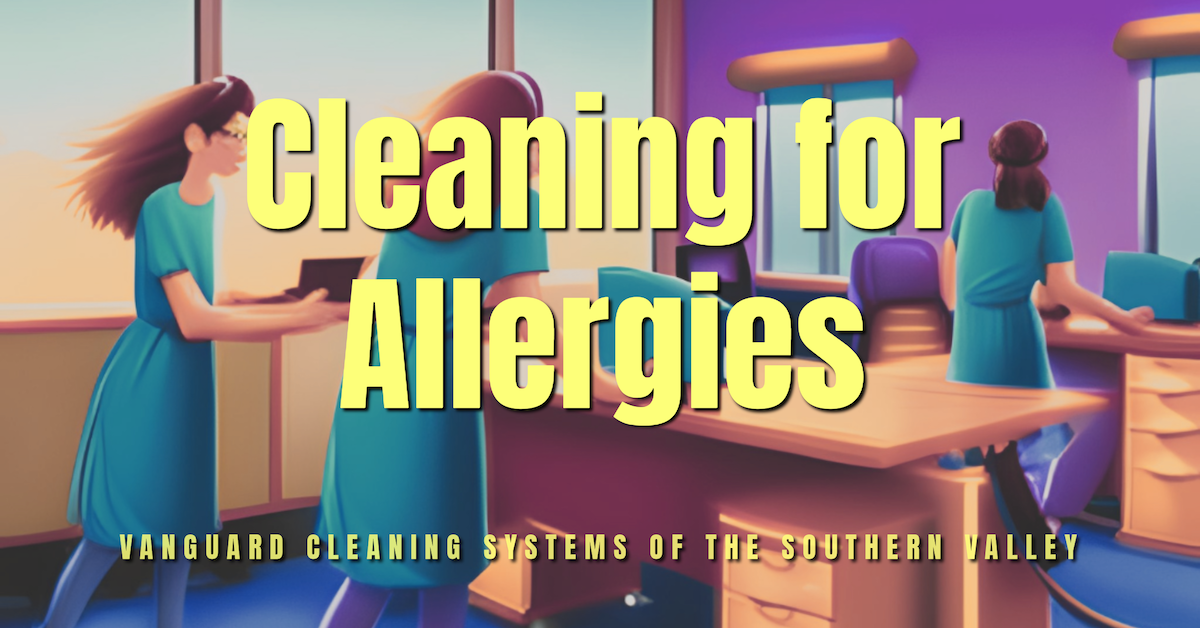Facility cleaning can help manage allergies and allergy symptoms by reducing the number of allergens in the environment that trigger various symptoms, such as sneezing, itching, and a runny nose.

The Importance of Clean Facilities for Allergy Sufferers
Allergens can build up in facilities over time through various sources, such as dust, pollen, mold, and pet dander, which can accumulate on surfaces and in the air, leading to increased levels of allergens in the environment.
These allergens can be difficult to remove without regular cleaning and maintenance, leading to a buildup over time.
Allergens can harm sufferers by triggering a range of symptoms, such as:
- Sneezing.
- Itching.
- Runny nose.
- Watery eyes.
- Coughing.
- Wheezing.
- Difficulty breathing.
These can significantly impact their quality of life and daily activities.
In severe cases, exposure to allergens can even lead to anaphylaxis, a life-threatening allergic reaction.
Additionally, prolonged exposure to allergens can increase the risk of developing asthma and other respiratory conditions, making it essential to manage allergen levels in facilities to promote a healthier environment for sufferers.
Keeping facilities clean and allergen-free is essential to promote a healthy environment and reduce the risk of triggering allergy symptoms in allergy sufferers.
Regular cleaning and maintenance can help remove allergens from surfaces and the air, reducing their buildup over time and creating a healthier environment for all occupants.
By implementing effective cleaning strategies and using hypoallergenic cleaning products, facility managers can help manage allergen levels and create a safer and more comfortable environment for everyone.
Ways Facility Cleaning Can Help Manage Allergies
Facility cleaning can play an essential role in managing allergies by:
Dusting surfaces regularly: Dust is a common allergen that can trigger allergic reactions. Regular dusting of surfaces can help reduce the number of dust particles in the air, which can alleviate allergy symptoms.
Vacuuming carpets and upholstery: Carpets and upholstery can harbor dust, pet dander, and other allergens. Cleaning these surfaces regularly can help remove these particles and improve indoor air quality.
Mopping floors: Hard floors can also harbor allergens, including dust and pollen. Mopping floors with a damp mop can help capture and remove these allergens.
Cleaning air filters: HVAC systems can circulate allergens throughout a facility if their air filters are not clean. Regularly cleaning or replacing air filters can help remove allergens from the air and improve indoor air quality.
Using hypoallergenic cleaning products: Cleaning products free from harsh chemicals and fragrances can be less irritating to people with allergies. Using hypoallergenic cleaning products can help reduce the likelihood of triggering allergy symptoms.
Removing clutter: Clutter can collect dust and other allergens, making it more challenging to keep a facility clean. Eliminating clutter can make cleaning easier and help reduce the number of allergens present in the environment.
The Benefits of Using Hypoallergenic Cleaning Products
Hypoallergenic cleaning products are designed to minimize the risk of triggering allergic reactions in sensitive individuals.
These products typically contain fewer chemicals and fragrances that can irritate the skin or respiratory system, making them a safer and more comfortable option for people with allergies or other sensitivities.
Further, using hypoallergenic cleaning products can also promote a healthier environment by reducing the number of irritants and toxins present in the air, creating a safer and more comfortable environment for all occupants.
The Importance of Decluttering
Clutter can contribute to allergen buildup in facilities by creating hiding places for dust, dirt, and other allergens.
Piles of paper, books, and other objects can collect dust, pet dander, and other allergens, which can be difficult to remove without regular cleaning.
Additionally, clutter can make it harder to access areas for cleaning, leading to a buildup of allergens in hard-to-reach places.
Clutter can also make it more challenging to ventilate areas, leading to increased humidity, moisture, mold growth, and increased allergen levels.
Reducing clutter through regular cleaning and organization can help manage allergen levels and promote a healthier facility environment.
Takeaway
Managing allergen levels in facilities is crucial to promoting a healthier environment and reducing the risk of triggering allergy symptoms in allergy sufferers.
Regular cleaning, including dusting surfaces, vacuuming carpets and upholstery, mopping floors, cleaning air filters, and using hypoallergenic cleaning products, can significantly reduce allergen buildup.
Additionally, reducing clutter can help manage allergen levels by eliminating hiding places for dust, dirt, and other allergens.
By implementing effective cleaning strategies and decluttering, facility managers can create a safer and more comfortable environment for everyone.
Onboarding and managing the requisite labor and material resources necessary to ensure the highest standards of cleanliness are achieved and maintained may prove cost-prohibitive for many organizations.
Outsourcing is a proven method for onboarding highly in-demand cleaning and disinfection services and experience for a fraction of the price of maintaining a similar service in-house.
If you would like more information regarding the effectiveness of high-performance infection prevention and control measures, or if you would like to schedule a free, no-obligation on-site assessment of your facility's custodial needs, contact us today for a free quote!
In Bakersfield, CA, call (661) 437-3253
In Fresno, CA, call (559) 206-1059
In Valencia, CA, or Santa Clarita, CA, call (661) 437-3253
In Palmdale, CA, or Lancaster, CA, call (661) 371-4756

